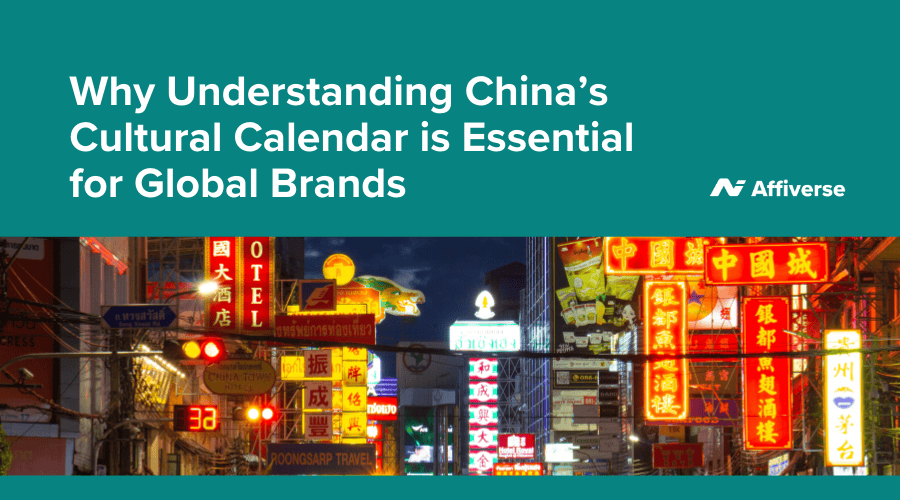Why Understanding China’s Cultural Calendar is Essential for Global Brands

For brands looking to make an impact in China, simply launching products and running ads isn’tenough. Timing is everything. The country’s cultural calendar is packed with key moments that drive consumer spending and shape marketing campaigns.
Events like Singles Day, Chinese New Year, and International Women’s Day aren’t just holidays, they’re massive retail opportunities that brands must plan for months in advance.
Marketing in China is unique. Consumer behaviour is influenced by tradition, astrology, and digital trends that shift faster than in many Western markets. Brands that fail to align their messaging with these moments risk missing out on millions in potential sales. Those that get it right can build stronger relationships with customers and drive significant revenue growth.
The Power of Festivals and Shopping Holidays
Chinese New Year remains the most important event of the year. Families reunite, gifts are exchanged, and spending surges across multiple categories, from fashion and beauty to travel and food. Luxury brands see a major spike in sales during this period, as giving high-end gifts is a common tradition. Digital platforms also play a huge role, with WeChat, Douyin (TikTok’s Chinese counterpart), and e-commerce giants like Tmall and JD.com running massive promotions.
Singles Day on 11 November (11.11) is the world’s largest shopping event, often surpassing Black Friday and Cyber Monday combined. Originally created by Alibaba, it has evolved into a multi-billion-dollar retail extravaganza. Discounts, live-stream shopping events, and influencer collaborations dominate the day, with global brands competing for attention. Unlike Western sales events, Singles Day is highly interactive, with gamified promotions, flash sales, and exclusive VIP deals that keep shoppers engaged.
Other key dates include: Qixi Festival (Chinese Valentine’s Day), 618 Shopping Festival (JD.com’s mid-year sale), and International Women’s Day, which has become a major event for beauty, fashion, and self-care brands. Each of these presents unique marketing angles that require localised messaging and tailored promotions to be effective.
Why Brands Must Adapt Their Strategy
A campaign that works in the US or Europe won’t necessarily translate well in China. Brands need to understand the cultural significance of each event and tailor their messaging accordingly. Simply offering discounts isn’t enough – consumers expect storytelling, exclusivity, and engagement through digital platforms.
Live streaming has become a dominant force in Chinese e-commerce. During major shopping festivals, platforms like Taobao Live, Kuaishou, and Douyin host interactive sessions where influencers showcase products, answer questions, and drive real-time purchases. Brands that integrate live streaming into their strategy see significantly higher conversions compared to traditional online advertising.
Another key difference is the role of super apps. While Western consumers rely on multiple platforms for shopping, social media, and messaging, Chinese consumers use a few all-encompassing apps like WeChat and Alipay. Successful brands don’t just advertise; they integrate their entire shopping experience into these platforms, from product discovery to checkout.
Lessons from Brands That Have Succeeded
Luxury brands have mastered the art of aligning with Chinese cultural moments. Gucci, Louis Vuitton, and Burberry consistently release limited-edition collections for Chinese New Year, featuring zodiac-inspired designs and exclusive packaging. These collections generate excitement and tap into the gift-giving culture that drives seasonal sales.
Nike and Adidas leverage events like Singles Day and 618 to offer personalised shopping experiences, including AI-driven recommendations and virtual try-ons. By using gamification and social commerce, they create buzz and keep customers engaged beyond just discounts.
Beauty brands like Estee Lauder and L’Oreal perform exceptionally well on International Women’s Day, crafting campaigns that celebrate empowerment while promoting self-care products. They collaborate with local influencers and KOLs (Key Opinion Leaders) to add credibility and trust, a critical factor in China’s competitive beauty market.
How Brands Can Prepare for Success
Success in China requires a deep understanding of cultural habits, spending patterns, and digital behaviours. Companies that treat these shopping events as long-term brand-building opportunities – rather than one-off promotions – will see sustained growth.
The most effective campaigns go beyond simple discounts and leverage storytelling, exclusivity, and interactive engagement. Whether through limited-edition products, immersive live-stream experiences, or seamless integration with super apps, brands that adapt to China’s retail culture will gain a competitive edge.
With AI-driven insights, influencer collaborations, and digital innovation, global brands have more tools than ever to connect with Chinese consumers at the right moments. The key is knowing when, where, and how to show up in a way that feels authentic and relevant to this fast-moving market.






